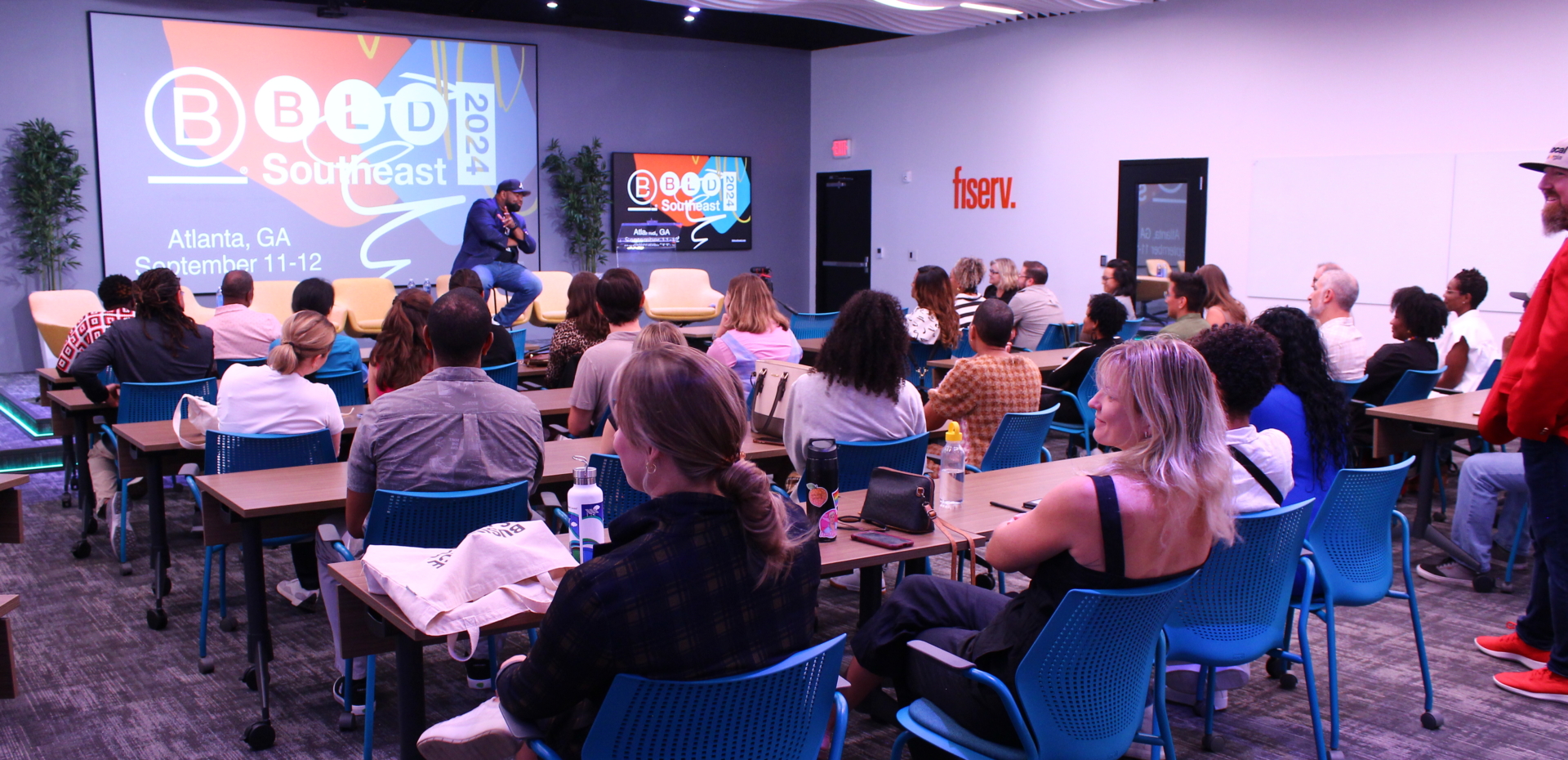Resources and Examples for Impactful and Scalable Businesses
October 2, 2024
A Roundup of Innovation and Information From BLD Southeast
Editor’s note: Hurricane Helene recently devastated the Southeast U.S., affecting people and businesses throughout the region. Members of the B Corp community are sharing ways to help. BLD Southeast shared a LinkedIn post with several options to help with recovery efforts, including a Small Business Relief Fund to support B Corps and other companies. Wes Griffin of B Local PDX highlights additional relief organizations in the region.
Embedding social and environmental impact while also scaling a viable business presents unique challenges. The Certified B Corporation community leans into shared learning and collaboration with partners and with each other to create a space to learn and grow together. The recent B Leadership Development (BLD) Southeast event in Atlanta drew hundreds of people in the B Corp ecosystem for two days of connection and conversation.
The BLD framework provides B Corps and partners an opportunity to explore ways to build more inclusive, resilient companies and share lessons of success and frustration. As Miren Oca of B Corp Ocaquatics Swim School said in a breakout session on evolving businesses: “We’ve done a lot of firsts, and it’s really hard to go first all of the time.”
To help other business leaders navigate their own firsts, B The Change shares this roundup from BLD Southeast, including:
- Actionable examples from businesses of multiple sizes from the session on evolving business, with an emphasis on employee engagement, employee ownership, and a four-day workweek model.
- Highlights from a panel on community business development that focused on fostering entrepreneurship and a supportive entrepreneurial ecosystem for Black business founders.
- Resources that any company can use to put profit to work in service of purpose, such as voting rights information and B Corp case studies.
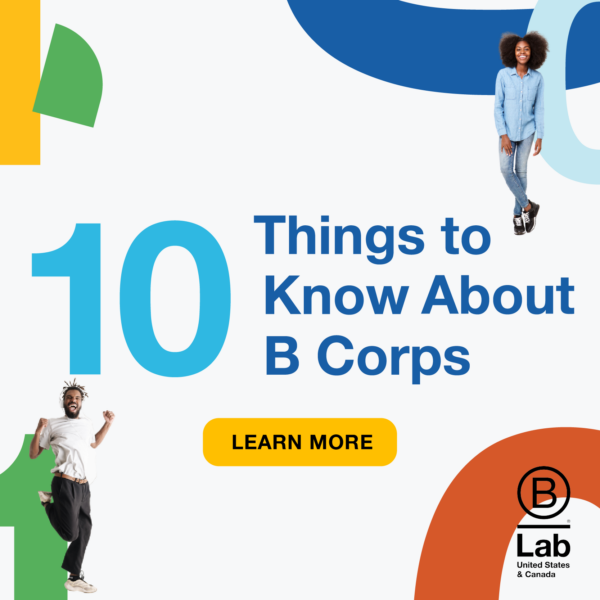
10 Things to Know About B Corps
Certifying as a B Corp is a major milestone and accomplishment — but it is just one part of a company’s ongoing impact improvement journey. This downloadable guide features information for people new to or curious about the Certified B Corporation community.

The “Leading Evolving Organizations” session featured, from left, Miren Oca, Jim Black, Dr. Donte Vaughn, Donna Cheung, and Enrique Alvarez.
Embracing Change: Strategies for Leading Evolving Organizations
One thing remains constant in the journey from a business concept to a sustainable business: change. While purpose can provide initial inspiration for employees, they also must feel connected and directed — aspects that naturally will change as the company evolves over time.
In a breakout session on “Leading Evolving Organizations,” B Corp leaders offered lessons and examples that emphasized the value of creating sustainable business strategies with workers, and included businesses that have adopted employee ownership or a four-day workweek model. “Evolving can mean so many different things in terms of leading organizations,” said moderator Dr. Donte Vaughn of LIGHTPOINT Advisors. “How does the work come to life as a result of your employees? How do you create an experience that makes them want to [stay] … and fulfill your vision and mission?”
Jim Black founded Impact GC, a pending B Corp, with a vision to create a different model in the legal industry for practitioners and clients that puts people first. Clients at the employee-owned law firm get an individualized approach, and the company goal is for its lawyers to have a 20-hour limit on monthly billable hours (compared to more than 150 billable hours a month often expected at other firms).
Impact GC also has lower billing rates compared to competitors, an intentional decision to make its legal services more accessible to smaller businesses. “It’s possible for our lawyers to not work too much and earn a good living, and for our billing rates to be fairly low as long as you reduce the profit margin,” Black said.
To further emphasize employee connections, Impact GC has an employee ownership model and helps clients pursue their own as well. “It can be a very powerful thing to bring your employees sort of under the tent of management and ownership, where they feel responsibility for the business. They feel like their voices are truly valued,” Black said, noting that employee ownership can be a tool to help combat wealth and income inequality.
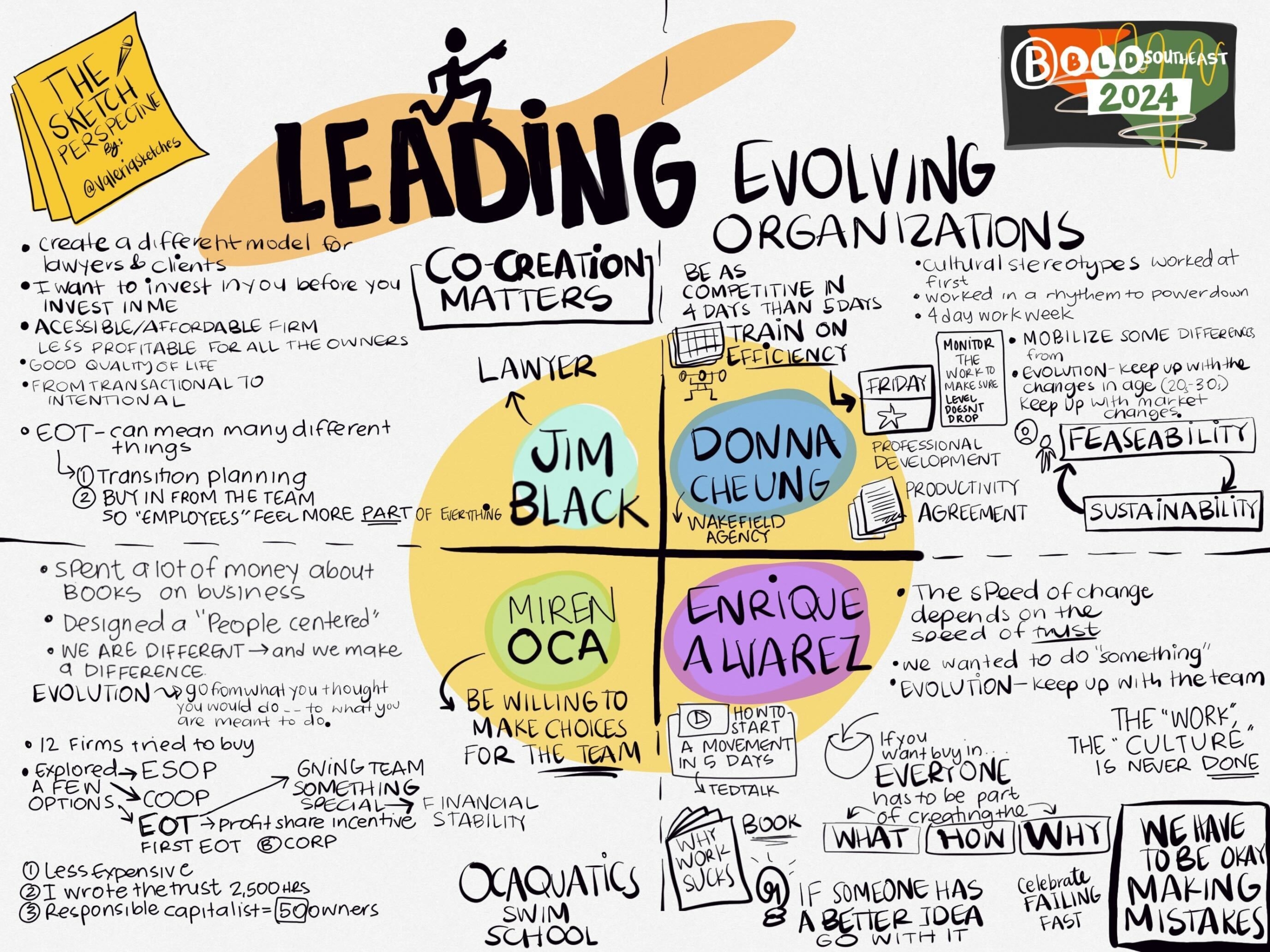
This sketchnote created by Valeria Rodriguez shares takeaways from the “Leading Evolving Organizations” session.
Employee ownership is one recent chapter in Ocaquatics Swim School’s 30-year evolution. Miren Oca started the company with a foundational goal of doing business better and putting people first. “We’re a service business. You take care of the people who care for the business,” she said. “We have the best relationships with our team members, and our team members have the best relationships with our customers.”
After she began to consider a succession plan for the company’s future, Oca determined an employee ownership trust would be the best fit. Anyone who has worked at least 2,500 hours for Ocaquatics is eligible. “I wanted it to be the people who had been there helping over the years,” she said. Of the 50 owners, 34 were born in another country, 70% are women, and 90% identify as Hispanic or Black. “We have 50 great, responsible capitalists. And I think the world needs more responsible capitalism,” Oca said.
By taking a fresh look at what was and wasn’t working, Donna Cheung and her colleagues at Wakefield Agency in Vancouver explored the path toward a four-day workweek. Higher levels of turnover in the organization and among clients plus growing feelings of burnout prompted the B Corp to make the shift. “We did this in co-creation with our team … and wanted to be just as competitive and excellent,” she said.
To support a feasible and sustainable change, the Wakefield team completed productivity training that included a wellness component in line with company values. “That helped provide skills and empower our team members,” she said. They also began to do more intentional time tracking to help increase results-based work and provide “a sense of accountability but also a sense of stewarding the time that we do have.” As Wakefield’s leader, Cheung also pointed to the importance of modeling the change and co-creating with team members to support its success. “We asked for and incorporated team feedback,” she said. “That provides for accountability.”
Team collaboration is also a practice at Vector Global Logistics, a new B Corp based in Georgia that provides logistics services in the U.S., Chile, China, Malaysia, Mexico, Peru, United Kingdom, and Vietnam. Co-Founder Enrique Alvarez helped launch the company in 2009 after seeing an opportunity to align logistics business practices with employee well-being while also creating a viable business. “Other logistics companies emphasize the hours. We put an emphasis on results,” he said.
At Vector, pursuing the vision of a different kind of business means building connections with employees and involving them in decisions. “Everyone has to participate in developing the culture,” he said. “We will never wake up and say, ‘Oh, we’re done.’ This is a culture, and culture evolves, culture develops. It takes daily work from everyone.”

The Future of Work Is Now
The community of Certified B Corporations knows that profits don’t have to come at the expense of other stakeholders. Learn more in this downloadable report.
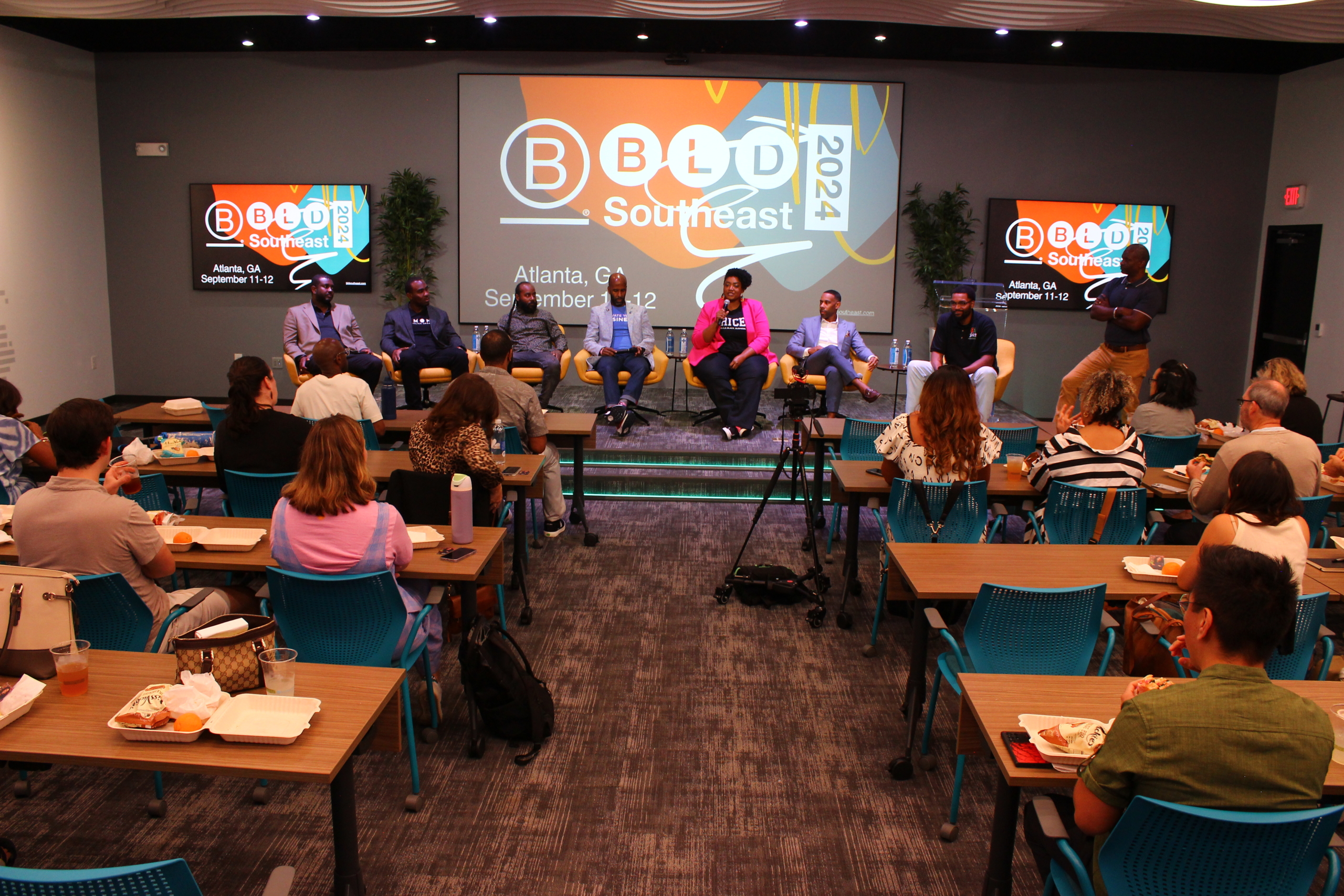
The Russell Innovation Center for Entrepreneurs provides programming and other support to Black entrepreneurs in Atlanta.
How RICE Fosters Community and Opportunity for Black Atlanta Entrepreneurs
Collaboration and community are essential elements at the Russell Innovation Center for Entrepreneurs (RICE). Named after the late Atlanta business leader Herman J. Russell, RICE serves as an economic mobility engine for Black entrepreneurs in Atlanta with support and programming to help build connections, create jobs, and grow businesses. The RICE Big IDEAS platform is designed to meet entrepreneurs where they are on their business journey and reinforce the importance of collaboration over competition.
A special panel at RICE as part of BLD Southeast featured Black business leaders from various industries who shared how the center has helped them scale businesses and foster a supportive entrepreneurial ecosystem. Danny Fitch, CEO and Founder of Natural Leaders Media, views entrepreneurship as a sport that requires training and teamwork like that provided at RICE. “I like to think of RICE as an oasis of opportunity. Every time I walk in the door, I can strike a deal,” Fitch said. “That deal doesn’t always mean ‘Oh, I can make some money.’ It may mean pushing somebody forward so they can make some money. … This space is just a myriad of opportunity.”
Dr. Azalea Hancock, Associate Professor at Life University, felt the support and opportunity that RICE provides during her initial interview to become a stakeholder. “The energy just immediately fills you,” Hancock said. “You have someone looking you in the eyes and telling you that you got this, and I immediately felt a sense of belonging. That was very empowering.”
A sense of opportunity and empowerment also drives Ricardo Berris in his work at Purpusly, which is an online platform for brands that prioritize social and environmental impact. “If you are creating a product today, you have to be thinking about impact from day one,” he said. “How do you see yourselves living on the planet, in your community over the next 20 years?”
The site reflects his background as an entrepreneur and his personal commitment to living a purpose-driven life. “You have to do the work to demonstrate that your company is practicing sustainability, and doing things to give back to the community and society,” he said. “We want to visualize those kinds of impact.”
Shakiri Murrain, RICE Director of Innovative Solutions, said being a RICE stakeholder means being a part of a broader business ecosystem that supports Black businesses in Atlanta and helps build a more inclusive economy. “Fighting against the institution is hard. Finding a collective that you belong to, so that you feel welcome and belonging in that ecosystem, is where it really starts,” he said.
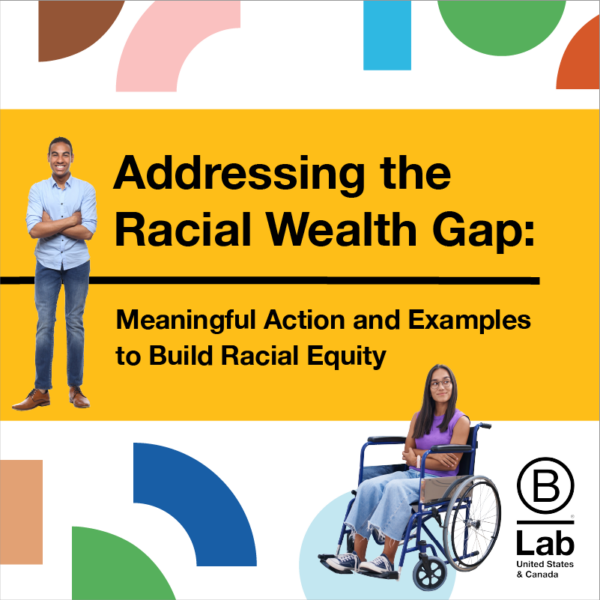
Addressing the Racial Wealth Gap
B Lab U.S. & Canada and the B Corp community seek to change a system that does not meet the needs of most. This downloadable guide shares resources and practices that can help drive economic systems change for the benefit of all.
From the Mainstage: Resources for Purpose-Driven Businesses
These resources shared at BLD Southeast include information and examples to help embed purpose and impact in companies:
- A playbook for purpose: Purpose-driven leaders can face unique financial challenges as they build businesses with positive impact in mind. In the “Thriving While Swimming Upstream” session, Mackey McNeill, CEO of MACKEY emphasized the importance of individual identity in creating a strong financial foundation: “Prosperity has to come from inside. You can’t prosper when you give your agency to someone else.” Her Prosperity Playbook outlines how to build better financial systems within businesses.
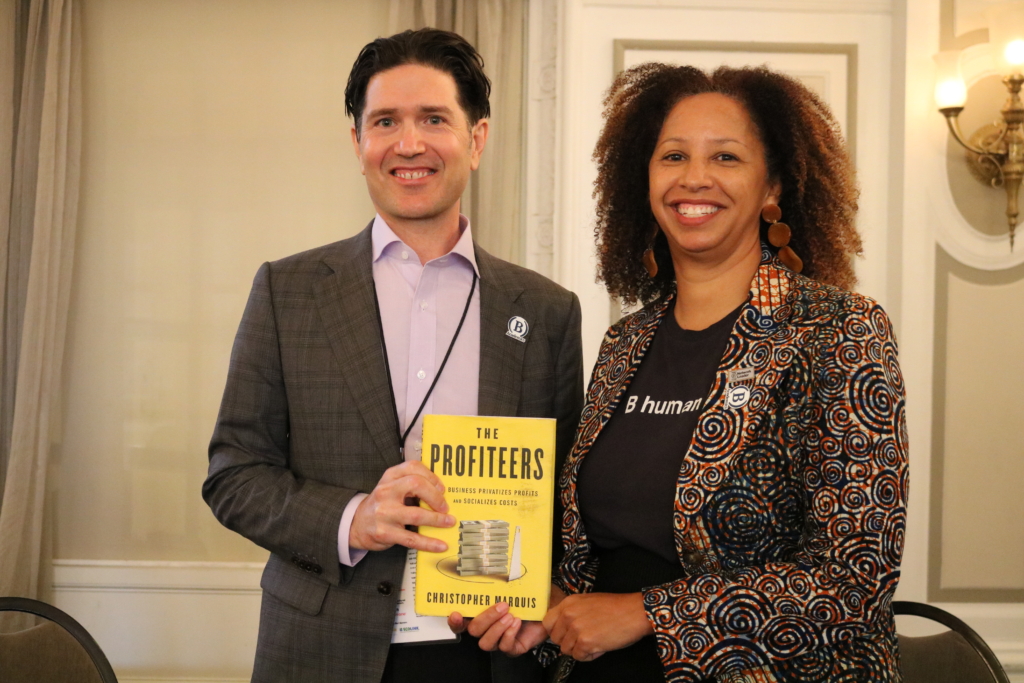
Author Christopher Marquis and Jessica Yinka Thomas of B Academics and North Carolina State University.
- B Corp case studies: Author Christopher Marquis joined Jessica Yinka Thomas of B Academics and North Carolina State University for a fireside chat. In his latest book, The Profiteers: How Business Privatizes Profit and Socializes Cost, Marquis examines how B Corps and other pioneers around the world are working to transform the way business is conducted.
- Conversations with courage: Jenn Graham, Founder & CEO of Inclusivv, addressed the importance of creating spaces for civil conversations and providing psychological safety in the workplace, which both can contribute to a more inclusive and vibrant economy. “Our capacity to respectfully disagree unlocks the power of diversity,” she said. “Psychological safety has been identified as the most important factor in team performance.” Inclusivv provides resources and information on these and other concepts in The Beginner’s Guide to Courageous Conversations.
- Voting rights resources: The BLD Southeast planning committee created a Voting Rights Toolkit with sample content and almost 50 ready-to-use graphics for companies to use in their internal and external communications. Learn more about this accessible and actionable resource in this article by B Corp leader Adrianne Gordon.
-

Stakeholder Economy
Resources to Help Businesses Support Civic Engagement for the 2024 U.S. Election
Read More -
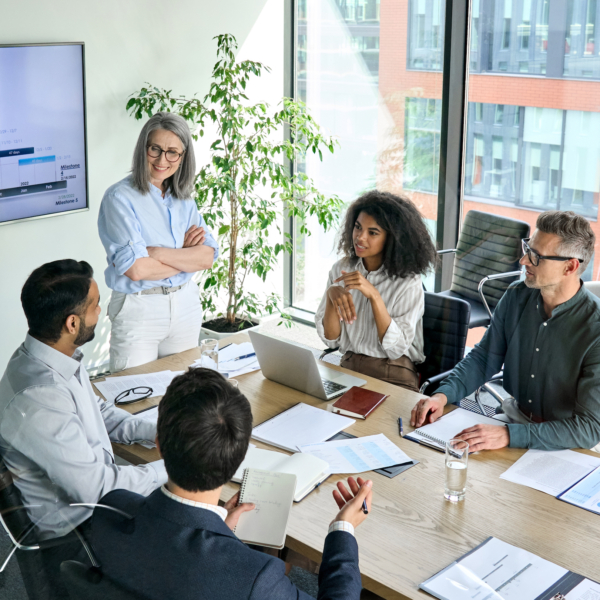
-
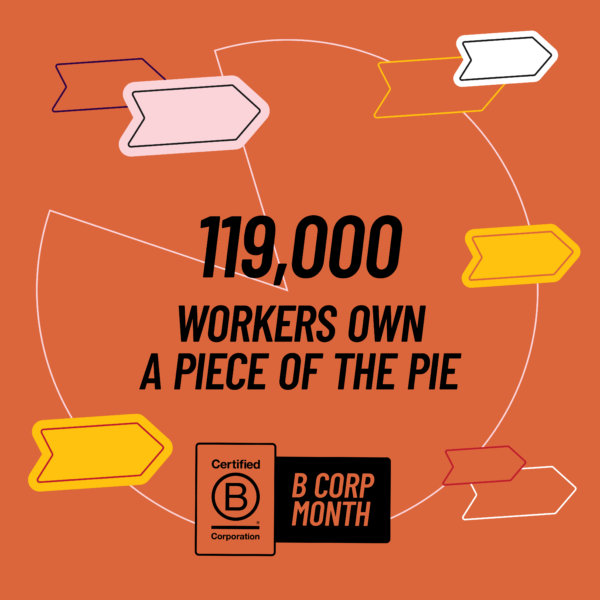
-
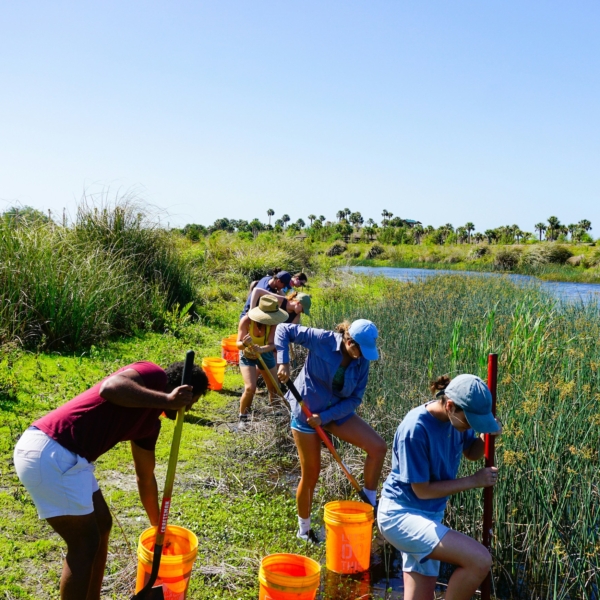
Sign Up for our B The Change Newsletter
Read stories on the B Corp Movement and people using business as a force for good. The B The Change Newsletter is sent weekly.
